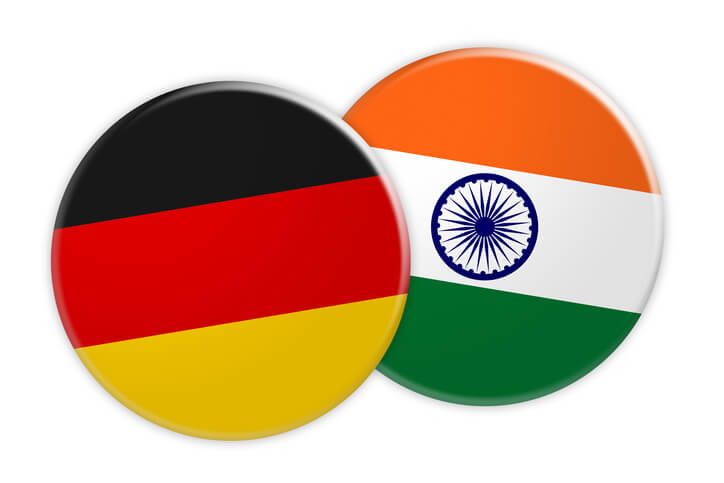In last decade, India’s healthcare system has developed considerably in few areas. Public sector efforts gained momentum with several initiatives by the government while private sector accomplished improving healthcare facilities and achieving insurance coverage. Furthermore, the government has allowed 100% FDI in healthcare through any form of investment (Greenfield or Brownfield). Market experts believe Indian healthcare sector to grow substantially and achieve its long-term healthcare vision over the next decade. This has become the key driver for India – Germany collaboration in the healthcare sector.
India’s health sector has been shaped by its national structure and the state government divisions of responsibilities and financing. The central government is accountable for international health treaties, medical education, and prevention of food contamination, quality control in drug manufacturing, national disease control, and family planning programs. It also sets national health policy along the with regulatory structure and supports the states.
The states are accountable for organizing and providing health services to their residents.
Overview of India–German collaboration
Indian healthcare sector is one of the fastest growing markets in the world whereas Germany is one of the largest pharma markets in the world. Today, Germany is India’s most important partners both bilaterally and internationally.
Germany is India’s largest trade partner in Europe with turnover around $23.8 billion. There is an enormous scope for investment by German companies in India and vice-versa. Regarding Foreign Direct Investment, Germany was the eighth biggest investor with an investment of US$ 599.93 million in the year 2009 and 2016-17 FDI was US$ 1.1 billion.
There is tremendous potential for cooperation between India and Germany in various sectors including healthcare, biotechnology, infrastructure development and telecom among others. India and Germany have a strategic partnership which was cemented by high-level bilateral exchanges. Apart from traditional sectors like Textiles, Chemicals, Pharma, Machinery there is considerable scope for cooperation in the fields of IT, biotechnology, renewable energy, green technology, urban mobility. Currently, German investments in India are mainly in the areas of transportation, electrical equipment, healthcare, metal industries, chemicals, construction, and automobiles.
Source: Read more at http://currentaffairs.gktoday.in/tags/india-germany/page/8
Recent agreements – India – Germany collaboration in healthcare sector
The governments of the India and Germany frequently meet to agree upon the priorities of cooperation between two great nations. Cooperative funding for research projects continues to be a major pillar of Indo-German cooperation. Current funding projects focus on materials science, biotechnology, health research, sustainability research, production technologies and smart cities.
- Agreement between Ministry of Health and BMG (Federal Ministry of Health) on cooperation in the health sector:
This agreement was signed in May 2017 after delegation level talks between Prime Minister Narendra Modi and German Chancellor Angela Merkel. It is focused on cooperation between India and Germany in the areas of biotechnology, healthcare, pharma & information technology, and sustainability research. The important consideration factor was the implementation of all the arrangements. The cooperation between German and Indian healthcare companies can significantly speed up the strategy with a considerable saving both regarding time and money. - Agreement between the AYUSH and BMG (Federal Ministry of Health) over cooperation in alternative medicine. This was the second deal in healthcare that got signed during PM Modi’s recent visit in May 2017. It is a Joint Declaration of Intent (JDI) between Germany and India that would lead to active collaboration between two nations in the field of Ayush and Natural Medicine. Union Cabinet approved this joint declaration of intent between Germany and India to promote Ayurveda, Yoga, and Naturopathy, Unani, Siddha and Homoeopathy (AYUSH). The major initiative was a joint research project between the Central Board for Research in Ayurvedic Sciences (CCRAS) and the Charite University of Berlin on Osteoarthritis of the knee.
- Cooperation between Indian Council of Medical Research (ICMR) and Helmholtz Association (HGF):During the visit of PM India Modi to Germany in 2016, the cooperation between Indian Council of Medical Research and Helmholtz Association began with the signing of a Memorandum of Understanding (MoU) which focuses on infectious diseases, oncology, and biomedical research. In a meeting held at Indian Council of Medical research, an Indo-German Science Centre for Infectious Diseases (IG-SCID) was inaugurated in 2007. The virtual center enables collective efforts between Indian and German scientists in the area of infectious diseases. During the recent visit of PM Modi, Helmholtz Centre and the Indian Council for Medical Research agreed to focus on future collaboration on Chronic Viral Disease and Anti-Microbial Resistance. This is a bilateral research promotional initiative as per Memorandum of Understanding (MoU) between the German Academic Exchange Service/Facility (DAAD) and the Department of Science and Technology (DST)This accord is proposed to strengthen the collaboration between Indian and German research groups which are working as a team. The program ’Project-based Personnel Interchange’ is solely intended to get financial support for research operations. This program gets funding from Government of India and Ministry of Education and Research.
Advantages for companies
- Funding assistance
- Promoting and mentoring Indian start-ups
- Promote and strengthen Indian accelerators/incubators
- Developing Industry-institutions partnership
- Bilateral conferences
Key goals/objectives for India – Germany collaboration in healthcare sector
The general purpose of these agreements is to strengthen further the Strategic Partnership between India and Germany by deepening cooperation on foreign policy on issues of sustainable development and improving trade & investment ties.
These agreements focus on determining plans, priorities, and review of the progress of the current programs and affirming the investment support. They provide a platform to develop collaborative work for finding healthcare solutions to the existing problems. Its aim is to develop comprehensive protection for innovation to ease and streamline trade between Indian healthcare customers and German healthcare companies. It also benefits Indian businesses to understand the necessity of innovations in this field.
The cooperation helps both nations to exchange information and give trainings to young professionals in cutting edge technologies of today. German companies have well-established diagnostic skills, and there exists an opportunity to yield the profit by cross-border cooperation with India. In India, the market for high-end diagnosing is growing at a very high rate, and most of the medical products are being imported. Germany could make a significant contribution in this field with the help of new agreements. The Virtual center also plays a proactive role in promoting and facilitating research activities.
Leaders both in India and Germany agree that the cooperation between India and Germany in healthcare, pharma, and biotechnology may yield rich dividends for both nations. The potential for the benefit of working together has been endorsed by both Indian and German decision makers in politics, businesses, and institutions. Hence India and Germany have taken many initiatives in recent years to strengthen this relationship.
For the benefit of both Indian and German companies, it is time for policy makers and investors to take the cooperation to the next level. Germany is well-established in pharma, biotechnology, and health sector. India needs both technology and investment to move up the ladder. Thus India offers an excellent opportunity for German companies and institutions.
Image credit: www.istockphoto.com

















